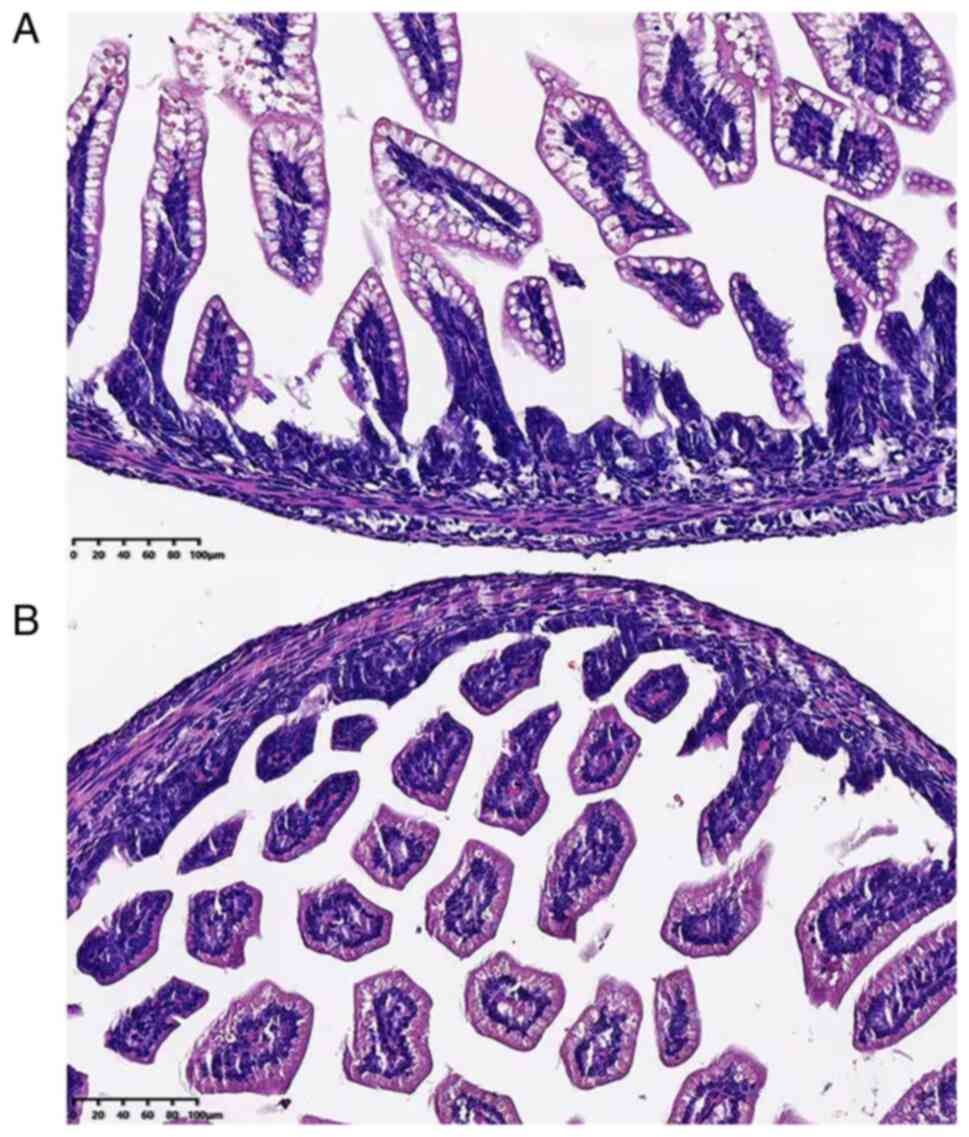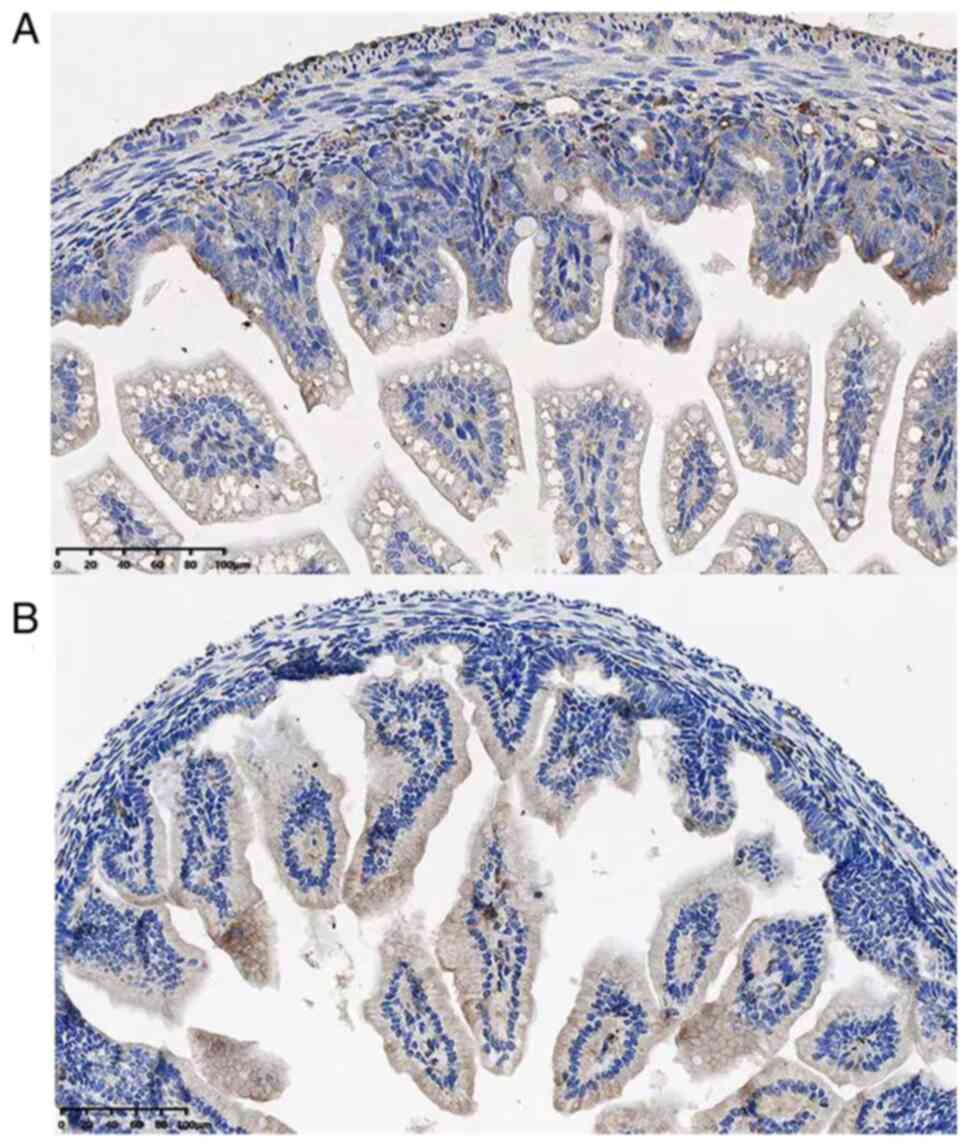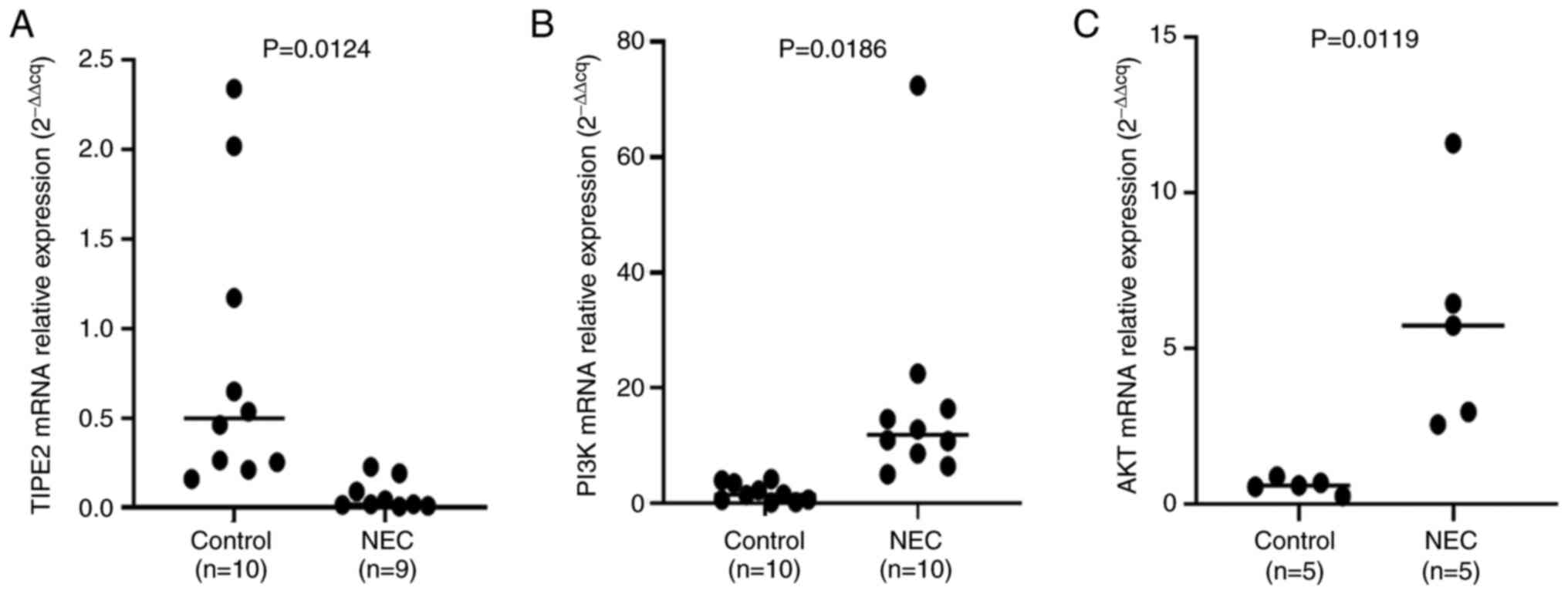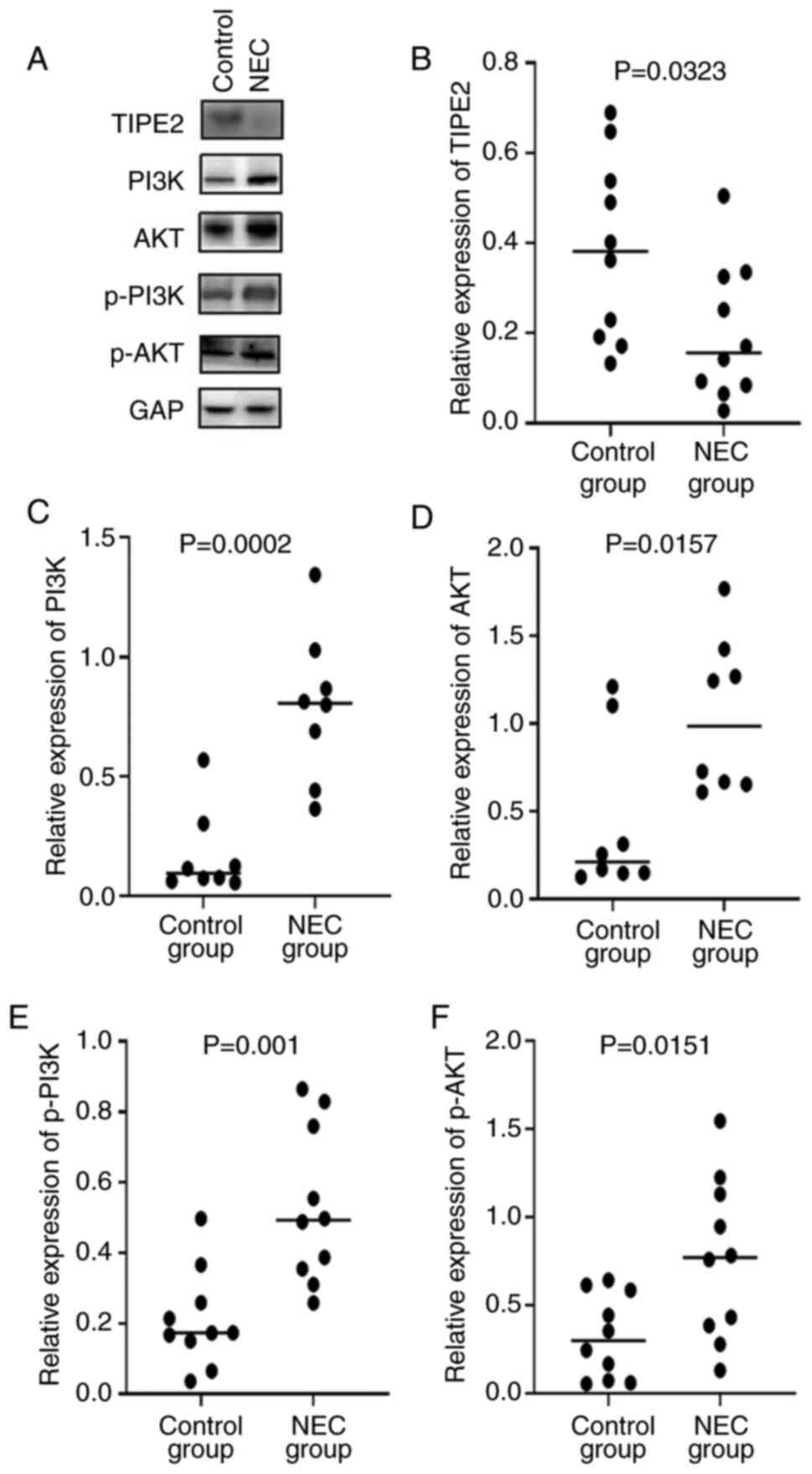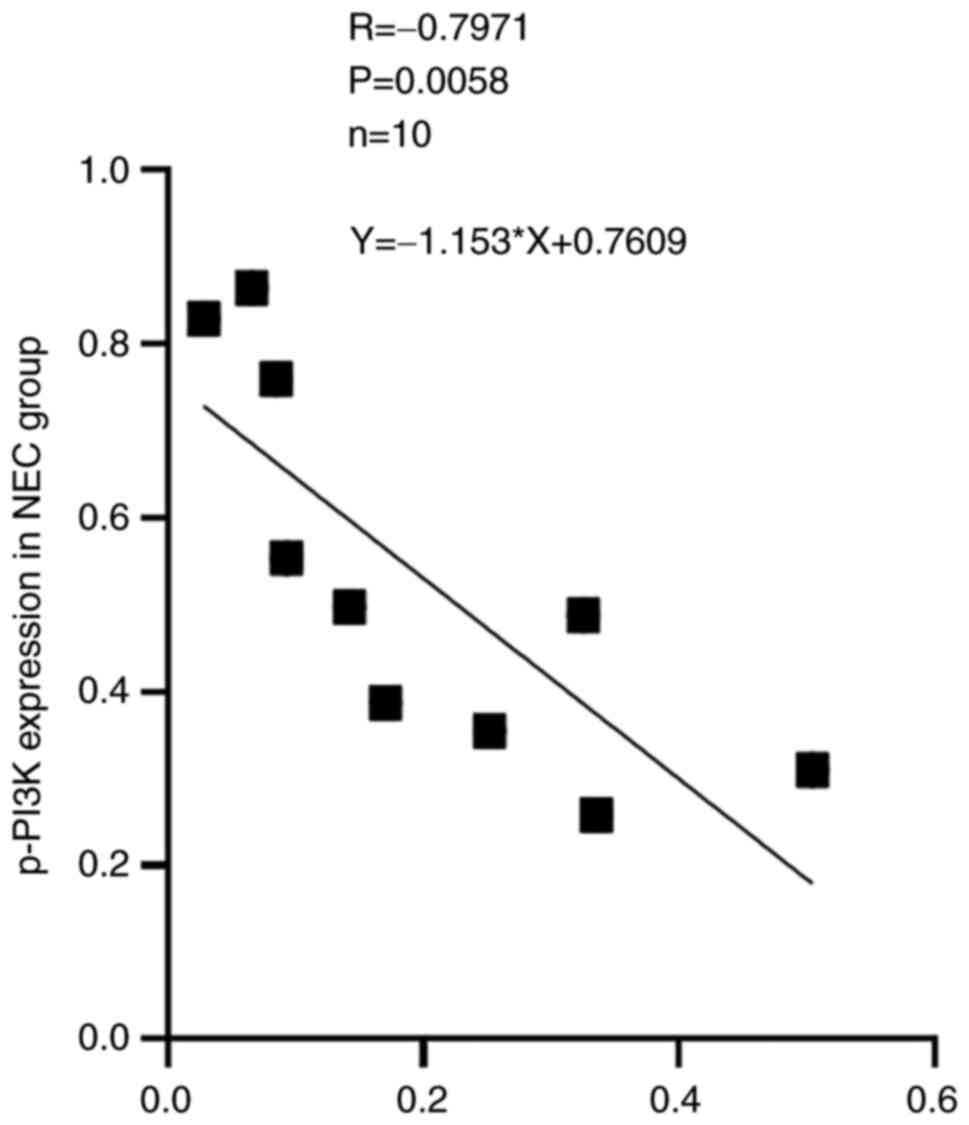|
1
|
Huang L, Fan J, Chen YX and Wang JH:
Inhibition of A2B adenosine receptor attenuates
intestinal injury in a rat model of necrotizing enterocolitis.
Mediat Inflamm. 2020(1562973)2020.PubMed/NCBI View Article : Google Scholar
|
|
2
|
Jung K, Koh I, Kim JH, Cheong HS, Park T,
Nam SH, Jung SM, Sio CA, Kim SY, Jung E, et al: RNA-seq for gene
expression profiling of human necrotizing enterocolitis: A pilot
study. J Korean Med Sci. 32:817–824. 2017.PubMed/NCBI View Article : Google Scholar
|
|
3
|
Prencipe G, Auriti C, Inglese R, Gallusi
G, Dotta A and De Benedetti F: The macrophage migration inhibitory
factor-173g/c polymorphism is not significantly associated with
necrotizing enterocolitis in preterm infants. J Pediatr Surg.
48:1499–1502. 2013.PubMed/NCBI View Article : Google Scholar
|
|
4
|
Aceti A, Beghetti I, Martini S, Faldella G
and Corvaglia L: Oxidative stress and necrotizing enterocolitis:
Pathogenetic mechanisms, opportunities for intervention, and role
of human milk. Oxid Med Cell Longev. 2018(7397659)2018.PubMed/NCBI View Article : Google Scholar
|
|
5
|
Fitzgibbons SC, Ching Y, Yu D, Carpenter
J, Kenny M, Weldon C, Lillehei C, Valim C, Horbar JD and Jaksic T:
Mortality of necrotizing enterocolitis expressed by birth weight
categories. J Pediatr Surg. 44:1072–1075; discussion 1075-1076.
2009.PubMed/NCBI View Article : Google Scholar
|
|
6
|
Martin CR and Walker WA: Probiotics: Role
in pathophysiology and prevention in necrotizing enterocolitis.
Semin Perinatol. 32:127–137. 2008.PubMed/NCBI View Article : Google Scholar
|
|
7
|
Zhu Y, Tao M, Wu J, Meng Y, Xu C, Tian Y,
Zhou X, Xiang J, Zhang H and Xie Y: Adenovirus-directed expression
of TIPE2 suppresses gastric cancer growth via induction of
apoptosis and inhibition of AKT and ERK1/2 signaling. Cancer Gene
Ther. 23:98–106. 2016.PubMed/NCBI View Article : Google Scholar
|
|
8
|
Liu ZJ, Liu HL, Zhou HC and Wang GC: TIPE2
inhibits hypoxia-induced Wnt/β-catenin pathway activation and EMT
in glioma cells. Oncol Res. 24:255–261. 2016.PubMed/NCBI View Article : Google Scholar
|
|
9
|
Wang Q, Ma L, Liu T, Ge C, Zhou Q, Wei C
and Shi W: TIPE2 suppresses pseudomonas aeruginosa keratitis by
inhibiting NF-κB signaling and the infiltration of inflammatory
cells. J Infect Dis. 220:1008–1018. 2019.PubMed/NCBI View Article : Google Scholar
|
|
10
|
Zhou J, Chen P, Li Z and Zuo Q: Gene
delivery of TIPE2 attenuates collagen-induced arthritis by
modulating inflammation. Int Immunopharmacol.
79(106044)2020.PubMed/NCBI View Article : Google Scholar
|
|
11
|
Lou Y, Sun H, Morrissey S, Porturas T, Liu
S, Hua X and Chen YH: Critical roles of TIPE2 protein in murine
experimental colitis. J Immunol. 193:1064–1070. 2014.PubMed/NCBI View Article : Google Scholar
|
|
12
|
Fruman DA and Cantley LC: Phosphoinositide
3-kinase in immunological systems. Semin Immunol. 14:7–18.
2002.PubMed/NCBI View Article : Google Scholar
|
|
13
|
Cantley LC: The phosphoinositide 3-kinase
pathway. Science. 296:1655–1657. 2002.PubMed/NCBI View Article : Google Scholar
|
|
14
|
Williams DL, Ozment-Skelton T and Li C:
Modulation of the phosphoinositide 3-kinase signaling pathway
alters host response to sepsis, inflammation, and
ischemia/reperfusion injury. Shock. 25:432–439. 2006.PubMed/NCBI View Article : Google Scholar
|
|
15
|
Hou Y, Lu X and Zhang Y: Irak inhibitor
protects the intestinal tract of necrotizing enterocolitis by
inhibiting the toll-like receptor (TLR) inflammatory signaling
pathway in rats. Med Sci Monit. 24:3366–3373. 2018.PubMed/NCBI View Article : Google Scholar
|
|
16
|
Auestad N, Korsak RA, Bergstrom JD and
Edmond J: Milk-substitutes comparable to rat's milk; their
preparation, composition and impact on development and metabolism
in the artificially reared rat. Br J Nutr. 61:495–518.
1989.PubMed/NCBI View Article : Google Scholar
|
|
17
|
Yin Y, Liu F, Li Y, Tang R and Wang J:
mRNA expression of TLR4, TLR9 and NF-κB in a neonatal murine model
of necrotizing enterocolitis. Mol Med Rep. 14:1953–1956.
2016.PubMed/NCBI View Article : Google Scholar
|
|
18
|
Livak KJ and Schmittgen TD: Analysis of
relative gene expression data using real-time quantitative PCR and
the 2 (-Delta Delta C(T)) method. Methods. 25:402–408.
2001.PubMed/NCBI View Article : Google Scholar
|
|
19
|
Lou Y and Liu S: The TIPE (TNFAIP8) family
in inflammation, immunity, and cancer. Mol Immunol. 49:4–7.
2011.PubMed/NCBI View Article : Google Scholar
|
|
20
|
Xi W, Hu Y, Liu Y, Zhang J, Wang L, Lou Y,
Qu Z, Cui J, Zhang G, Liang X, et al: Roles of TIPE2 in hepatitis B
virus-induced hepatic inflammation in humans and mice. Mol Immunol.
48:1203–1208. 2011.PubMed/NCBI View Article : Google Scholar
|
|
21
|
Li F, Zhu X, Yang Y, Huang L and Xu J:
Tipe2 alleviates systemic lupus erythematosus through regulating
macrophage polarization. Cell Physiol Biochem. 38:330–339.
2016.PubMed/NCBI View Article : Google Scholar
|
|
22
|
Ding J, Su J, Zhang L and Ma J: Crocetin
activates Foxp3 through TIPE2 in asthma-associated treg cells. Cell
Physiol Biochem. 37:2425–2433. 2015.PubMed/NCBI View Article : Google Scholar
|
|
23
|
Zhang Y, Wei X, Liu L, Liu S, Wang Z,
Zhang B, Fan B, Yang F, Huang S, Jiang F, et al: TIPE2, a novel
regulator of immunity, protects against experimental stroke. J Biol
Chem. 287:32546–32555. 2012.PubMed/NCBI View Article : Google Scholar
|
|
24
|
Li HM, Li KY, Xing Y, Tang XX, Yang DM,
Dai XM, Lu DX and Wang HD: Phenylephrine attenuated sepsis-induced
cardiac inflammation and mitochondrial injury through an effect on
the PI3K/Akt signaling pathway. J Cardiovasc Pharmacol. 73:186–194.
2019.PubMed/NCBI View Article : Google Scholar
|
|
25
|
Zhang B, Wang Y, Jiang C, Wu C, Guo G,
Chen X and Qiu S: Valeriana jatamansi Jones inhibits
rotavirus-induced diarrhea via Phosphatidylinositol
3-Kinase/Protein Kinase B signaling pathway. J Microbiol
Biotechnol. 31:1115–1122. 2021.PubMed/NCBI View Article : Google Scholar
|
|
26
|
Camps M, Rückle T, Ji H, Ardissone V,
Rintelen F, Shaw J, Ferrandi C, Chabert C, Gillieron C, Françon B,
et al: Blockade of PI3Kgamma suppresses joint inflammation and
damage in mouse models of rheumatoid arthritis. Nature Med.
11:936–943. 2005.PubMed/NCBI View
Article : Google Scholar
|
|
27
|
Oudit GY, Sun H, Kerfant BG, Crackower MA,
Penninger JM and Backx PH: The role of phosphoinositide-3 kinase
and PTEN in cardiovascular physiology and disease. J Mol Cell
Cardiol. 37:449–471. 2004.PubMed/NCBI View Article : Google Scholar
|















